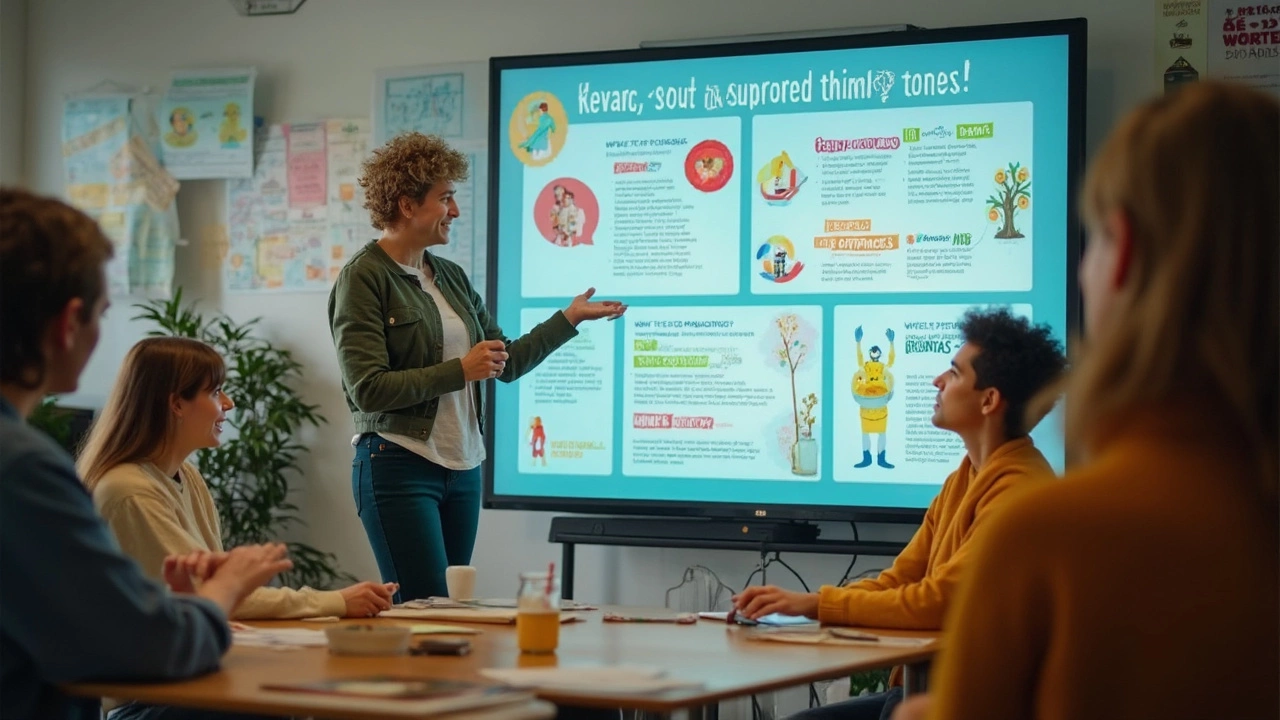Sex, for most people, isn't something that magically sorts itself out after puberty. So why do we stop making it a priority to learn more as we get older? The truth is, adult life throws curveballs at your sex life. Bodies change. Jobs and families compete for your energy. Yet, somehow we're expected to know it all—or at least, not talk about it unless there's a problem. That's wild, isn’t it? Especially when science keeps unveiling facts and busting old myths about what really goes on in the bedroom. And let's be honest, no one gets it perfect every time, no matter what your streaming service rom-coms suggest.
The Upside of Still Figuring Sex Out
The world keeps shifting, and so do people’s sexual needs and experiences. Think about how much has changed in the last decade alone—online dating, the normalization of open relationships, a sharper focus on consent, and better resources on pleasure and health. All these changes mean our biggest mistake as adults is thinking there's nothing left to learn. Did you know that most people in long-term relationships will hit a sexual rut at least once? That's not a sign of defeat—it's a sign you might need new tools in your kit. Studies from 2023 showed that couples who talk openly about their desires and boundaries have more satisfying sex lives, and they're closer emotionally, too.
Older folks especially benefit from keeping up-to-date. Hormones shift. Medication can affect libido. Menopause and andropause come into play. Suddenly, the old approaches don't work as well—and, believe it or not, a lot of people don’t ever get real info on these topics from their doctors. Instead, we rely on what we learned back in school (which usually focused on STDs and pregnancy, not actual pleasure) or on trial and error. Why settle for that?
Now, don't think learning as an adult means sitting in a dusty lecture hall or feeling awkward. No, it’s about growing your confidence and keeping curiosity alive. You might read a new book about experimentation, check out modern research, or chat with sex workers who are often surprisingly well-versed in the art and science of pleasure. Some people turn to podcasts, watch documentary series, or even take couple’s classes. The payoff? A sex life that evolves right along with you.
Let’s look at a few real-world ways learning helps:
- Better Communication: New research says couples who talk openly about sex fight less and break up less. That’s not a happy coincidence.
- Managing Health: Getting clued in to viral trends in sexual health (like HPV vaccination updates) can protect your well-being down the line.
- More Pleasure: Learning about anatomy—yours and your partner’s—makes things better. Many women still don’t know that only about 20% can orgasm from vaginal penetration alone. That’s a fact a lot of couples wish they’d known sooner.
- Busting Myths: Plenty of people believe things about sex that simply aren’t true, from penis size to female desire to ‘normal’ frequency. Knowledge sets everyone free from insecurity.
- Relationship Longevity: Those who regularly try new things and discuss fantasies report more resilient relationships, according to a big 2024 European survey.
There’s also a sense of relief when you realize you’re not the only one figuring things out. Sex is deeply personal, sure, but the more you learn, the easier it gets to share and connect with a partner—whether that’s a spouse, hookup, or London escorts helping broaden your perspective.

No One Gets a Gold Star: Why Sex Is a Lifelong Class
If you think you’re alone in not knowing everything after all this time, you’re way off. That feeling is surprisingly common. The reality is, even experts keep learning about sex—and what we thought we knew often shifts. Just look at the constant updates surrounding sexual health policy, LGBTQ+ identities, or even the way porn affects expectations in and out of bed.
What about the impact of tech? Twenty years ago, the idea of meeting someone via a swipe would’ve been hard to imagine; now, people are negotiating consent by text and sharing fantasies before even meeting face to face. That changes the game in terms of both risks and rewards. Safe sex today isn’t just about condoms, but also digital privacy, understanding new types of intimacy, and navigating conversations about boundaries—things your old-school sex ed class never covered.
Here’s something surprising: adult learners are more likely to look for information on improving desire, pleasure, and communication than on STI prevention, according to Google Trends reports from late 2024. That’s a sign people want more than ‘don’t get pregnant or sick.’ They want actual enjoyment and emotional connection. Not everyone has a friend group willing to get into the nitty-gritty, so seeking out credible resources is low-key life-changing. A 2022 survey of adults in the UK found those who read sex-positive books or followed sex educators online reported significantly higher relationship satisfaction—by as much as 30%. It shows that those who keep learning get more out of their connections, romantically and sexually.
Physical changes also demand ongoing learning. It’s normal for arousal patterns, stamina, or physical responses to shift with age or after things like childbirth. Men can experience changes in erections, women with lubrication or sensitivity. Sometimes it’s temporary, sometimes it needs the right approach or support. Many adults find tips like using different lube types, changing up positions, or even practicing pelvic floor exercises (yes, men and women both) can bring back satisfaction. The trick is not giving up when things change, but digging into the ‘why’ and finding new ways to connect. That’s lifelong learning in action.
When you know more, you also get better at talking about awkward stuff. Did you know Americans list talking about sex with a long-term partner as more nerve-wracking than public speaking? Yet, those who do report fewer regrets and miscommunications. A classic trick is to ask open-ended questions or use humor to break the ice. Or, if you want to try new things but feel weird bringing it up, you can share an article or podcast together as a conversation starter.
Here's a quick table of just a few ways adult education keeps your sex life healthy, happy, and exciting:
| Area of Learning | Real Benefit |
|---|---|
| Communication | Better alignment with partner needs and consent, less guesswork |
| Anatomy & Physiology | More pleasure, fewer misunderstandings about what feels good |
| New Techniques | Keeps things fresh and fun, helps break routine |
| Sexual Health Updates | Stay safer, avoid risks from outdated info |
| Inclusivity | More empathy and understanding for different experiences or identities |
It’s not about reaching ‘expert’ level. It’s about staying open, asking questions, and refusing to let shame or old stories limit your enjoyment—or your partner’s.

Making Continued Sex Learning Part of the Good Life
A lot of people don’t realize how much better life can get when you bring curiosity, humor, and a willingness to learn into the bedroom. Sure, it’s not always easy—old beliefs die hard, and not everyone grew up in a sex-positive household. But every time you choose to read, talk, or experiment, you create space for more confidence, deeper trust, and those ‘wow, I didn’t know that!’ moments that can totally shake things up for the better.
So, what’s the best way to take the leap? Start by picking a question you’ve always had but never asked. Look it up from a reputable source—maybe a certified sex educator, a sex-positive therapist, or someone working in the field (and yes, talking to experienced sex workers can offer insights you won’t find in textbooks). You could watch educational videos, listen to podcasts, or join online discussions that dive into topics you’re curious about. Don’t forget about good old-fashioned books, which often go deeper than any article or video ever could.
Trying something new? Make it fun and pressure-free. Maybe it’s buying a different kind of lube, using a new toy, or learning a massage technique. Even changing the lighting or the music can flip a script if things feel stale. And, don’t be afraid to laugh—sex can be awkward or messy, and sharing a laugh is sometimes the best foreplay.
Remember, everyone’s journey looks different. What matters is not resting on auto-pilot or feeling like there’s a finish line. If you’re single, continued learning means you know what you want and can communicate it. If you’re in a relationship, it’s about growing together, sidestepping the pitfalls that trap so many couples, and enjoying that spark for years to come.
If you feel stuck, there’s no shame in reaching out. Sex therapists, relationship counselors, even workshops with sex-positive communities can help. As the world of sex research keeps expanding, so does the number of supportive people and places ready to point you in new directions.
At the end of the day, the best thing about keeping curiosity alive is how it seeps into every part of life. You get better at listening, asking for what you need, letting go of old insecurities, and showing up fully. That’s the kind of personal growth that pays off far outside the bedroom—at work, with friends, and in your own self-confidence. So, don’t buy into the myth that learning about sex is just for kids or couples in crisis. It’s one of the best lifelong projects you can take on.
Embrace your role as a student of intimacy, not because you’re broken, but because there’s always more to savor. Trust me, growth never stops being sexy.
